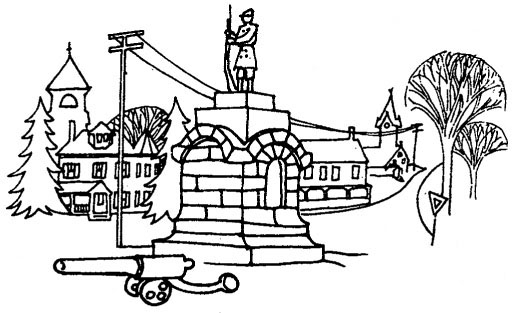
4
Suppose two men, both in fear of drowning by water; one stands on a firme rock, the other on a quick-sand.…
Reverend Peter Bulkeley
Concord, 1646
Ed Bell was long overdue at home. On the way past the parsonage, he slowed down, wondering if he should stop in for a minute to encourage Joseph Bold. But then he pulled away and accelerated again, because he really didn’t have time. And anyway the man would be all right. He would handle his first service perfectly well. Confidently Ed drove home and apologized to his frantic wife and called upstairs to his daughter Eleanor, and soon the three of them were on their way to church.
As their car swept past the Bolds’ house, Ed didn’t even give it a second glance.
The parsonage of the Old West Church was a homely Victorian structure almost lost behind two enormous Norway spruce trees that threw the front porch into impenetrable shadow. Within the house, Ed Bell’s angelic confidence was not the mood of the morning. But Joe Bold was doing his best to seem poised and self-assured in front of the Shookys, who had stopped by for Claire. Then, gathering up his sermon from his desk and throwing his black robe over his arm, he said goodbye and stepped out on the back porch to walk up to the church.
Instantly his attention was assailed by the washing on the line in the yard. He had hung it out himself the day before, and he should have brought it in after supper, because there had been rain in the night. Now the sheets and towels were drenched, but they billowed in the morning breeze and subsided, and filled again with air and fell back. One of his shirts hung between him and the low streaking sunlight, lifting its arms, flinging them wildly, dancing, hurling itself outward. It was ridiculously like himself, but transfigured. There in the backyard hung this phenomenon, half natural, half polyester, seizing his attention.
But Joe was used to that. Everything everywhere beckoned him, crooked its finger at him; that was the trouble. Rocks and clouds plucked his arm, crumpled paper bags on the sidewalk called to him, every petal on a flowering bush had its own voice. It dizzied him, wore him out, to keep turning and looking and gasping politely, “Yes, yes, I see, I see.”
As he turned out on the road, for example, he couldn’t help noticing the way the drops falling from the high trees were plummeting straight down, glittering as they fell. He couldn’t help hearing the bird in the branches overhead make a tentative light remark before it flew away.
As usual, Joe was strongly affected. Ever since he could remember, his senses had been more intensely vulnerable than other people’s. His first memories were of sharp visions, the blue sky above his playpen, ants on blades of grass, shadows tumbling on a blanket. Later on, walking to school, he had been transfixed by the sleek furry coats of dogs, by weedy thickets in a brushy field, by sandwich wrappers blowing across the playground. His teacher had complained to his mother: “Joseph always seems to be somewhere else. I can’t get the boy’s attention.” Then, in adulthood, Joe had discovered the transcendentalists, and learned that these airy manifestations were metaphors, mystical pedagogical remarks by God, who never stopped talking in a language composed of the droplets in a cloud or the sap running up a tree, or the willful behavior of the elements of a dividing cell. It was a garrulous communication that never ceased, a gabble of molecules, a continuous proclamation by cobblestones and the bark of trees, by constellations of stars and by cracks in the sidewalk, an endless monologue of Visual splendors.
Now Joe was thirty-eight—too old, it seemed to him, for what he had accomplished. Six years of his life had been wasted as a student of zoology, attempting to transform the ignorant rapture of his childhood into a useful profession. For two long years in graduate school, he had been mired down in the examination of the skeletal differences among blowfish. When at last he had come to his senses, he had simply walked across the dingy parking lot from the Harvard Museum of Comparative Zoology to the Divinity School. There he had spent another four years, preparing for ordination as a clergyman.
His new career had seemed satisfactory, the right one for Joseph Bold. Until recently, the ministry had seemed his true calling. Throughout his years in the big Congregational church in Pittsburgh, he had spoken from a reservoir that seemed unfailing. His ecstatic apprehension of his surroundings had been like Henry Thoreau’s intoxication with the song of the wood thrush. Like Thoreau, he had been Drunk, drunk, drunk, dead drunk. For Joe, Thoreau’s wonder at a nutshell in his hand had become a talisman—I looked at a walnut shell this morning, and saw that it was made for joy.
For joy? Bitterly, Joe walked under the dripping trees in the cool, moist air. In his own hand Thoreau’s shell had broken open to reveal a worm, and now the worm was rearing up like some dread creature of the jungle, swaying and coiling itself around Claire. All Thoreau’s transcendent joy had been merely self-delusion. How could anyone be such a fool as to believe in it?
Above him now as he walked to church, the telephone wires looped from pole to pole, shining in the sunlight like strands of spiderweb. The tall grass beside the pavement was a mass of delicate parallels straining upward. Joe was compelled to see it, but he no longer had faith in it.

“You promise and promise and never deliver,” he told the grass resentfully. Walking past the Civil War memorial on the Common, he crossed Farrar Road and entered the church.